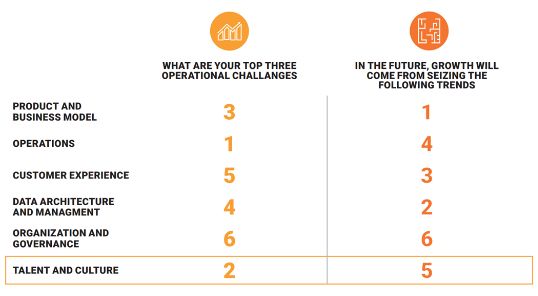Too many fast-growing born-digital businesses take shortcuts with HR and talent management. They can get away with that only for so long, and then the consequences strike. Those that infuse discipline and rigor into their talent management strategies—early on—will stand the best chance of sustaining their earlier successes far into the future, even in the face of unprecedented challenges such as the COVID-19 pandemic.
This article is part of our Born-Digital study, where AlixPartners set out to research born-digital companies' unique blend of strengths and challenges and identify the most pressing needs and areas of focus needed to sustain their success.
"Culture is key. It is very rare that a management team understands how to hire and who to hire for the time when the company becomes much larger and more complicated. Companies are almost always behind on this topic, and we almost always strongly encourage them to hire a world-class chief talent officer to get on the journey quickly. It is a critical path."
It's no surprise that given their rapid growth rates, when it comes to steering the areas of talent management and human resources (HR), born-digital companies are almost always behind in applying the elements of bestpractices: recruitment and retention, providing feedback, career development, employee rewards and compensation, workforce diversity, organizational design, executive alignment, and succession planning. And, we find that threeother conditions often exist.
A limited HR function causes the bulk of execution to fall to a severely overtaxed line management team, with predictable results.
- When a satisfactory HR function exists, it is typically understaffed both from capability and scale standpoints.
- Many HR professionals continue to recruit, develop, and align digital talent and teams by using the rearview mirror.
- In other words, HR professionals are using frameworks and work-skills definitions that are usually based on those used by analog companies and those pertinent to more traditional talent management practices.
When born-digital companies are in the stages of rapid growth, they must both recruit and retain people with various capabilities that are in high demand. In an environment like this, an argument could easily be made that a world-class HR function is the most important ingredient for sustained success. But we find that at virtually every born-digital company, management, boards, investors, and employees say they feel that HR is an underdeveloped area and one in need of genuine leadership.
By strengthening their leadership on this front, born-digital businesses can not only sustain successful growth; they can also better position themselves to respond quickly and flexibly to unprecedented challenges, such as thosearising from the pandemic.
Talent management practices reported by born-digital companies:
- 19% prioritize documentation of expectations and metrics in fostering board-executive alignment
- 35% reported having succession plans in place for their CEOs and other senior leaders
- 62% reported that their turnover rates were at or above industry norms
Born digital's prioritized areas to invest in for growth
Born-digital companies rated the area of talent and culture low on the list of areas to invest in for growth—as fifth out of six options—followed by organization and governance in sixth place. However, born-digital companies consider talent and culture as their second biggest current challenge—second only to operations.

Top three strategies to attract, recruit, develop and retain talent
Both born-digital and traditional companies prioritize focus on competitive salaries and the work environment to attract and retain employees. Born-digital companies rated development opportunities as number three, whereas traditional companies rated autonomy as number three.
Another aspect of effectively integrating and running HR processes at born-digital companies that merits mention is the degree of integration between HR and the line operation. In a company that has been around a long time and that is not growing as rapidly as it used to, it's possible to build an HR function that is more independent and that operates as a service to the operations of the business. In our interviews with born-digital line managers, we detected a strong need for HR to be tightly integrated with business operations because things are moving and changing so rapidly that without tight integration, HR runs the risk of being too disconnected from the business to be effective.
Leaders' takeaways
So, what is a born-digital company to do to scale effectively—from an HR perspective? Our takeaways are as follows.
- Hire a deeply qualified leader early who knows how to develop and run a quality human resources/talent management function, as well as how to work with management and the board to develop—and sustain—a highly functional and pertinent organizational structure as the company grows. The person should report directly to the CEO.
- Make sure the CEO and the executive team understand the talent leader's role, the position's centrality and strategic importance, and the removal of any obstacles or resistance early in the appointment.
- Embed HR resources directly into the line functions they serve. That doesn't mean the resources have to report to those line areas. In fact, they should not. But given the pace of growth and change and the need to be in touch with the culture of the firm, decentralization of the operation is a good practice for the scaling of Born-Digital companies.
- Emphasize the necessity of a build-out of quality human capital performance-management processes. Certainly, all professionals crave feedback and development, which is especially true among younger employees that born-digital companies are trying to attract and retain. And even though compensation will always be an important factor, members of this demographic crave feedback on which to base the development of both themselves and their careers. Most younger professionals today—especially those drawn to jobs in born-digital companies—are active learners inherently impatient with their careers, and so they need—even demand—to see clear paths ahead for them if they remain with the organization. They understand well the rapidityof change, and they know intuitively that their own skill development must keep pace. Therefore, best practice dictates that every professional have a development and career plan and receive frequent and actionable performance feedback.
- Start succession planning now. Born-digital companies are thinner in themanagement ranks than their older, born-traditional counterparts are. So, when a key executive departs, it can leave a big hole in the team, thereby compromising the ability to get things done. Succession planning should therefore become an evergreen process that is designed by the head of HR/talent and led by the CEO. All of the key, value-creating roles should be profiled, and high potentials should be assessed against those roles as readynow, ready in one year, and ready in two years. The board should request a review of talent twice a year, and the CEO should lead the discussion.
- Install someone on the board who is experienced in the development, building, and sustaining of high quality HR/talent management organizations. Such a representative helps the CEO learn the value of that function, and gives line executives an advocate at the board level to influence direction and policy.
Download the PDF, here
The content of this article is intended to provide a general guide to the subject matter. Specialist advice should be sought about your specific circumstances.





